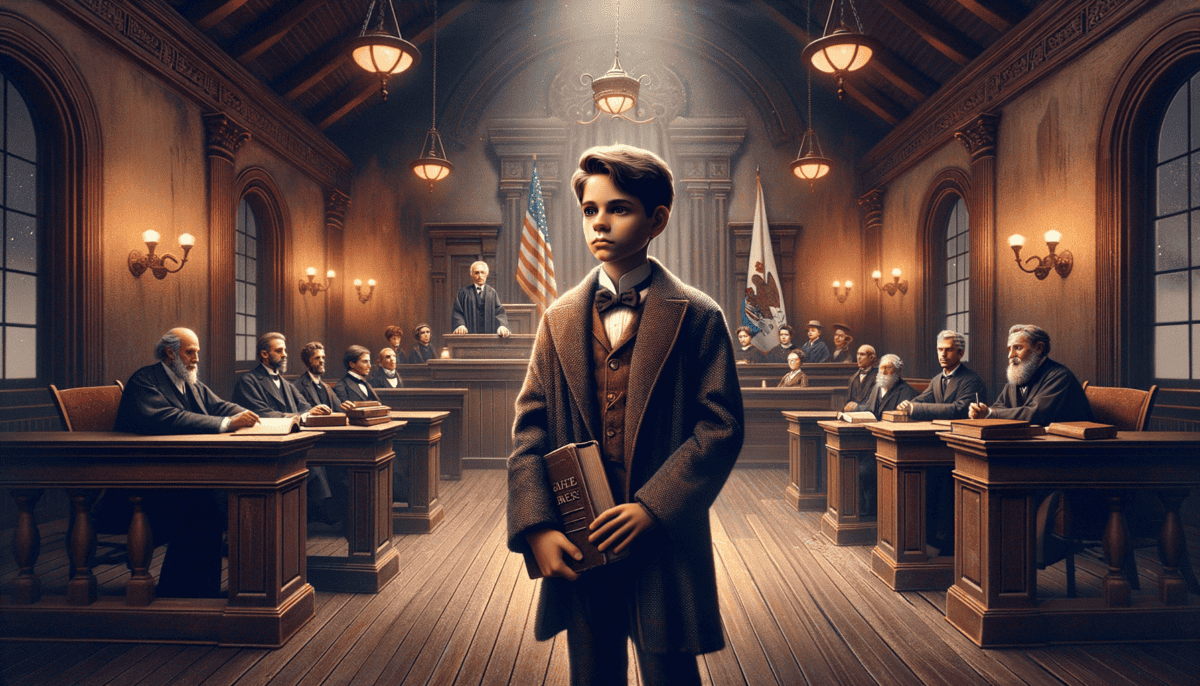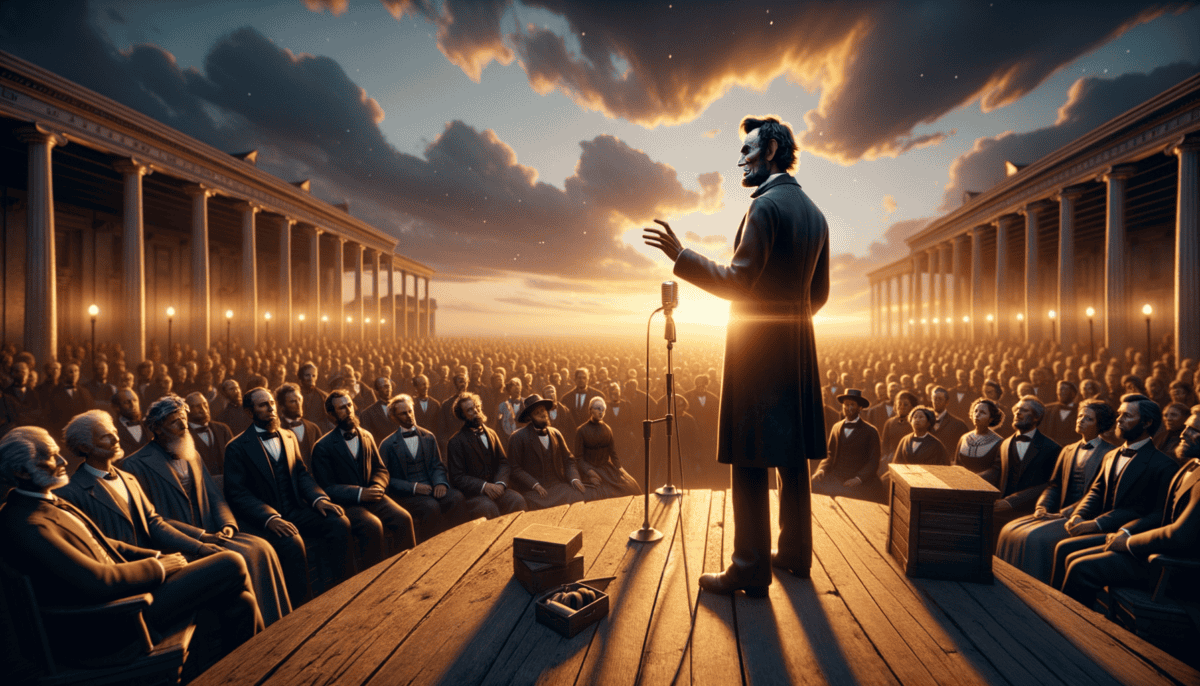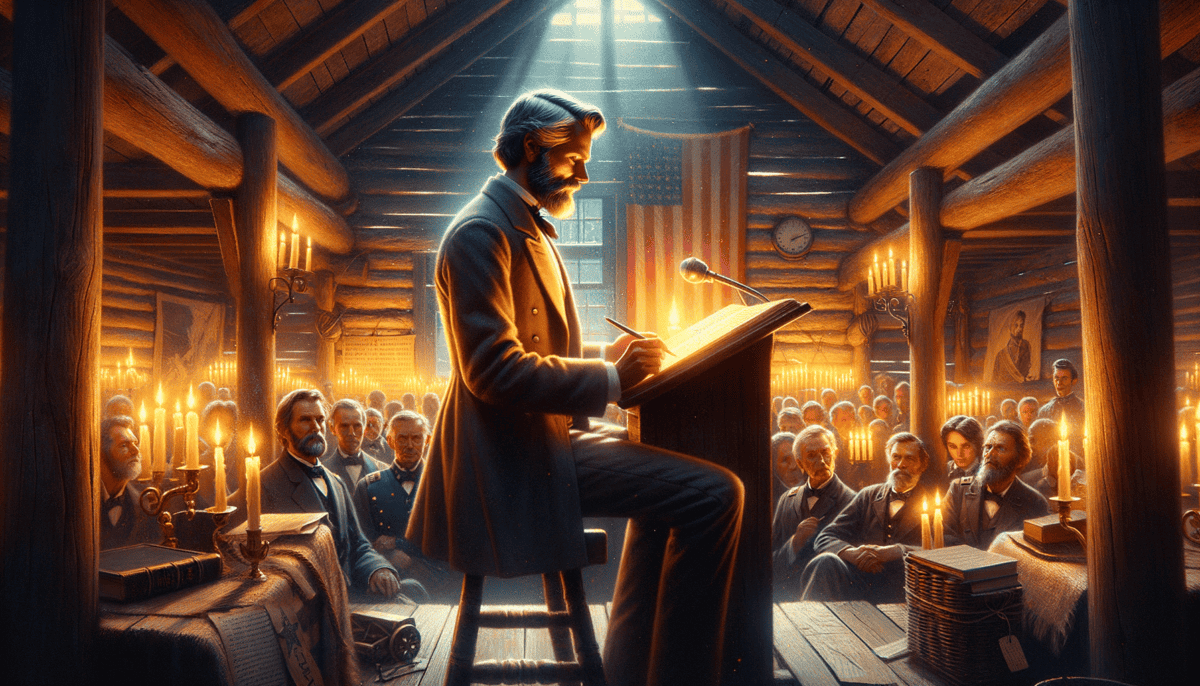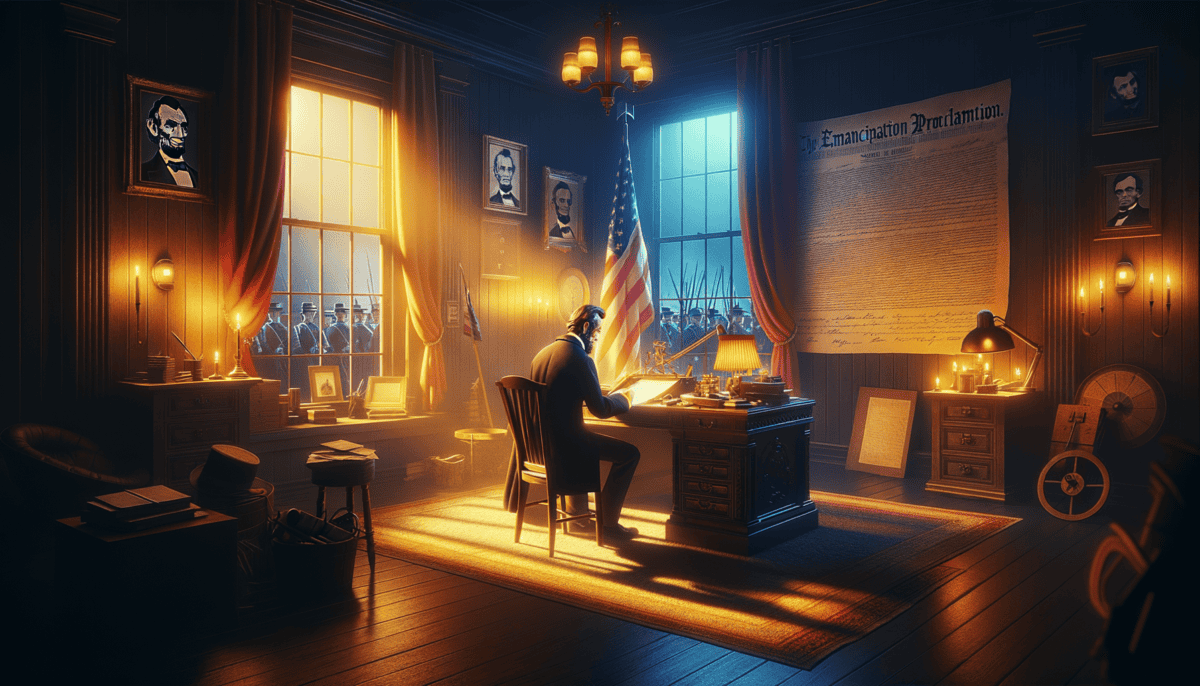A Boy in a Log Cabin
On a cold winter morning in 1809, a special baby was born in a tiny log cabin. His name was Abraham Lincoln. The cabin sat in the woods of Kentucky, and it wasn't much bigger than a classroom!
Little Abe's parents, Thomas and Nancy Lincoln, were farmers who worked very hard. They didn't have much money, but they had lots of love for their children. The cabin had just one room, with a dirt floor and one window.
Young Abe grew up just like other frontier children. He helped his father chop wood and plant corn. His sister Sarah taught him games, and they played together in the forest. But what Abe loved most was learning!
"Abe," his mother would say, "you have a special gift for learning." She taught him his first letters and words. Even though they only had a few books, Abe read them over and over again.
Life wasn't easy in the Kentucky wilderness. The Lincoln family had to:
• Hunt for their food
• Make their own clothes
• Build their furniture
• Grow their crops
When Abe was seven years old, his family moved to Indiana. They had to build a new home in the middle of thick woods. It was hard work, but young Abe helped by carrying tools and holding boards while his father built their new cabin.
“I remember those early days,” Abe would say years later. “We had to work from sunrise to sunset, but I always found time to read.”
Sadly, when Abe was nine, his mother Nancy became very sick. She called Abe to her bedside and whispered, "Be good to your father and sister. And never stop learning, my boy."
It was a very sad time for the Lincoln family. But about a year later, Abe's father married a kind woman named Sarah Bush Johnston. She brought books with her and encouraged Abe to read and learn.
Even though he could only go to school for a few months each year, Abe never gave up on learning. He carried a piece of chalk in his pocket and practiced writing words on any flat surface he could find. Sometimes he would write in the ashes of the fireplace or draw letters in the dirt!
"Knowledge," his new mother Sarah told him, "is worth more than gold."
Every night, Abe would lie in his bed in the loft of their cabin, thinking about all the things he had learned that day. He dreamed of doing big things and helping people. Little did he know that one day, this poor boy from a log cabin would become one of the most important people in American history.
“All that I am, or hope to be, I owe to my angel mother,” Abe would say when he grew up, remembering both the mother who gave him life and the stepmother who helped him grow.
The frontier was tough, but it made Abe strong. He grew tall and strong like the trees around his home. His hands became rough from work, but his mind grew sharp from reading. This was just the beginning of an amazing journey for the boy from the log cabin.
Learning and Growing
Young Abe Lincoln grew taller and stronger each day. By the time he was fifteen, he was already six feet tall! He worked many different jobs to help his family and learn new skills.
"I'll do any honest work," Abe would say with a smile. And he meant it! He split rails for fences, worked on boats going down the Mississippi River, and even ran a small store.
One day, while working at the store, Abe found he had made a mistake. He had given a customer the wrong change – just a few pennies too little. After the store closed, Abe walked three miles to return those pennies!
"A person's character is like a tree and their reputation like its shadow," Abe would say. "The shadow is what we think of it; the tree is the real thing."
But Abe never stopped learning. He borrowed law books from his friends and studied at night by candlelight. Sometimes he would walk for miles just to borrow a new book!
"My best friend is the man who'll get me a book I ain't read," Abe often said with a twinkle in his eye.
Here are some of the jobs Abe did while studying to become a lawyer:
• Flatboatman on the Mississippi River
• Store clerk
• Postmaster
• Surveyor
• Rail-splitter
People started noticing how smart Abe was. They would gather around to hear him tell stories and make speeches. He had a way of explaining difficult things so everyone could understand them.
Finally, after years of hard work, Abe became a lawyer! He didn't go to law school like most lawyers did. Instead, he taught himself by reading and studying on his own.
"Where there is a will, there is a way," Abe would tell young people who asked how he did it.
As a lawyer, Abe rode on horseback from town to town, helping people with their problems. He became known for being fair and honest. People trusted him because he always tried to do what was right.
Soon, Abe started thinking about bigger ways to help people. He decided to try something new – he wanted to be a leader in government! He ran for a spot in the Illinois state government, and guess what? The people chose him! ️
"If I am elected," Abe promised, "I will work hard to help make life better for everyone."
In the government, Abe learned how to make speeches that moved people's hearts. He wasn't afraid to stand up for what he believed was right, even when others disagreed with him.
Through all his success, Abe never forgot where he came from. He remembered the little log cabin and how hard he had worked to learn and grow. He still loved reading and learning new things.
The tall, kind lawyer from Illinois was becoming well-known throughout the state. People respected him for his honesty and wisdom. But even bigger challenges and opportunities lay ahead for Abraham Lincoln.
A Voice for Justice
Abraham Lincoln stood tall at his desk, reading about something that made his heart heavy. Many people in America were kept as slaves. This wasn’t right, and Abe knew it.
“Mary,” he said to his wife one evening, “we must do something about this terrible thing called slavery.” Mary Todd Lincoln nodded, knowing her husband’s strong beliefs about doing what was right.
Abe began traveling around Illinois, giving speeches about freedom. People would gather in town squares and fields to hear him speak. Sometimes, the crowds were so big that he had to stand on boxes to be seen!
“A house divided against itself cannot stand,” Abe would say. He meant that America couldn’t be half-free and half-slave forever.
In 1858, Abe had seven big debates with another politician named Stephen Douglas. They talked about whether slavery should spread to new parts of America. The debates were like very important conversations in front of lots of people.
“If slavery is not wrong, nothing is wrong,” Abe declared, his voice strong and clear.
Even though Abe didn’t win that election against Douglas, something amazing happened. His words spread across the country! Newspapers wrote about his speeches, and more people learned about his ideas.
Here are some things that made Abe different from other politicians:
• He used simple words everyone could understand
• He told funny stories to explain serious ideas
• He wasn’t afraid to stand up for what was right
• He treated everyone with respect, even people who disagreed with him
One day, a group of important people came to see Abe. “We want you to run for president,” they said. Abe thought long and hard about it. Being president would be very difficult, but it might be his chance to help end slavery.
“If I am president,” Abe said, “I will work to make this country better for all people.”
As Abe traveled and spoke more, he noticed something worrying. The country was splitting into two groups. People in the North and South had very different ideas about slavery and other important things.
More and more people started paying attention to Abe’s words. They saw that he was honest, smart, and cared about doing what was right. Some people didn’t like his ideas, but many others thought he might be just what America needed.
The tall lawyer from Illinois was becoming one of the most important voices in America. His words about freedom and fairness were changing how people thought. Big changes were coming to the country, and Abraham Lincoln was ready to lead the way.
The Race for the White House
The year was 1860, and Abe Lincoln was getting ready for the biggest challenge of his life – running for president! ♂️ The country was like a big family having a really big argument.
“Mary,” Abe said to his wife one morning, “people are worried about what might happen if I win.” Mary squeezed his hand and smiled, “Just keep telling the truth, Abe.”
Abe couldn’t travel around to give speeches like other people running for president. Instead, he stayed home in Springfield, Illinois. But his friends traveled everywhere, telling people about his ideas.
“We need someone honest to lead our country,” Abe’s supporters would say. “That’s why we call him Honest Abe!”
People started wearing special pins with Abe’s picture. Some even carried rails from fences he had split long ago! They wanted to show everyone that Abe was just like them – someone who worked hard and believed in doing what was right.
“A president should work for all the people,” Abe wrote in his letters, “not just some of them.”
As election day got closer, more problems started popping up. Some states in the South said they would leave America if Abe won! They were scared he would take away slavery right away, even though Abe said he wouldn’t.
• Keep the country together
• Stop slavery from spreading
• Help farmers and workers
• Build new railroads
On election night, November 6, 1860, Abe waited in his office for news. Telegraph machines clicked away, bringing results from all over the country. His friends kept running in with good news!
“Mr. Lincoln,” they shouted, “You’ve won! You’re going to be president!”
But Abe didn’t just feel happy. He felt worried too. He knew being president would be very hard. Some states were already talking about leaving America. They called it “secession.”
Mary helped Abe get ready to move to Washington D.C. They packed their things and said goodbye to their friends in Springfield. Their house on Eighth Street wouldn’t be their home anymore – they were moving to the White House! ️
Before leaving Springfield, Abe gave one last speech to his neighbors and friends. “I go to take on a task bigger than anything I’ve done before,” he said. “I hope you will pray for me.”
The train ride to Washington was long and sometimes scary. Some people were so angry about Abe winning that they wanted to hurt him! His friends had to protect him and keep him safe.
When Abe finally got to Washington, he looked up at the Capitol building. It wasn’t finished yet – workers were still building the dome. “Just like our country,” Abe thought, “it’s still being built, and we all need to help finish it.”
Dark Days of War
The Civil War started with a big BOOM! In April 1861, soldiers in South Carolina started shooting at Fort Sumter. Abe Lincoln knew this was the beginning of something very hard for America.
“I never wanted this fighting,” Abe told Mary one night. “But we must keep our country together.” Mary nodded and said, “You’ll find a way, Abe.”
Being president during a war was super hard. Abe didn’t get much sleep. He spent lots of time reading messages about battles and talking to his generals. Sometimes he visited soldiers in their camps. ️
The soldiers loved seeing President Lincoln. He was so tall in his black coat and tall hat! He always tried to cheer them up with funny stories.
But Abe had been thinking about something very important. He knew the war wasn’t just about keeping the country together – it was about making things right. He wanted to free all the slaves!
“If slavery isn’t wrong, nothing is wrong,” Abe said to his friends.
On January 1, 1863, Abe did something very brave. He signed a special paper called the Emancipation Proclamation. This paper said that all slaves in the states that left America were now free!
• Made slavery against the law in rebel states
• Let Black people join the Union army
• Showed the world America was fighting for freedom
Many Black soldiers joined the Union army to fight for freedom. They were very brave, even though some people were mean to them. Abe made sure they got paid the same as white soldiers. ⚔️
“Once I am a soldier,” one Black soldier said, “I am not a slave anymore. I am fighting for freedom!”
The war was long and very sad. Many soldiers on both sides died. Abe often visited hospitals to talk to hurt soldiers. He wrote letters to moms and dads whose sons didn’t come home.
But in 1863, something good happened! The Union army won a big battle at Gettysburg, Pennsylvania. Abe went there to give a speech. We call it the Gettysburg Address.
The war started going better for the Union army. General Ulysses S. Grant was winning lots of battles. People started to think the war might end soon!
At home, Mary tried to help too. She visited hospitals and helped hurt soldiers. Their son Tad went with Abe to army camps and made friends with the soldiers. The whole Lincoln family wanted to help win the war.
By 1864, many slaves were free and running to Union lines. They helped the army as scouts, cooks, and workers. Some families even lived in camps near Washington. Abe visited them and listened to their stories. ♀️
The war was changing America forever. Abe knew there would be no more slavery when it was over. But he also knew it would be hard to bring the country back together. He wanted everyone – North and South – to be friends again.
As 1864 turned into 1865, more good news came. The Union army was winning big battles. The Confederate army was getting smaller. Maybe soon, the fighting would stop! ️
A Nation Forever Changed
Spring came to Washington in 1865. The cherry trees were blooming pink and white. After four long years of war, good news finally arrived – the Confederate army was giving up!
People all over Washington were so happy! They sang songs and had parades. Abe stood on the White House balcony and smiled at the celebrating crowds.
“Mary,” Abe said to his wife, “now we can help heal our country.” Mary squeezed his hand and replied, “You’ve done so much already, dear Abe.”
Abe wanted everyone to be kind to the Southern states. “They are not our enemies anymore,” he told his friends. “They are our brothers and sisters.”
He had big plans to help rebuild the South and make life better for freed slaves. He wanted to build schools and help farmers get back to work.
“With malice toward none, with charity for all,” Abe said in his famous speech. He wanted everyone to work together to fix America.
On April 14, Abe and Mary decided to go see a play at Ford’s Theatre. They were happy and holding hands. The war was over, and spring was in the air!
The whole country was very sad. People everywhere cried when they heard the news. Even people in the South were upset – they knew Abe wanted to help them rebuild.
A long train carried Abe’s body back to Springfield, Illinois. Millions of people stood by the train tracks to say goodbye. They put flowers on the tracks and sang sad songs.
“He gave his life to make our country whole and free,” one little girl said as she placed a flower on the tracks.
Abraham Lincoln changed America forever. Because of him:
• The country stayed together as one nation
• People learned that everyone deserves to be treated fairly
• America became stronger than ever before
Today, we remember Abe Lincoln as one of our greatest presidents. His face is on the penny and the five-dollar bill. There’s a big memorial for him in Washington, D.C. ️
But the best way we remember Abe is by trying to be like him – honest, kind, and always standing up for what’s right. He showed us that someone from a tiny log cabin could grow up to change the world.
Every time we see his picture or read his words, we remember the tall man in the black hat who saved America and made it a better place for everyone. His story will inspire people forever. ⭐
As one of Abe’s friends said: “Now he belongs to the ages.” And that means his story will live on forever, teaching new generations about courage, honesty, and doing what’s right.






